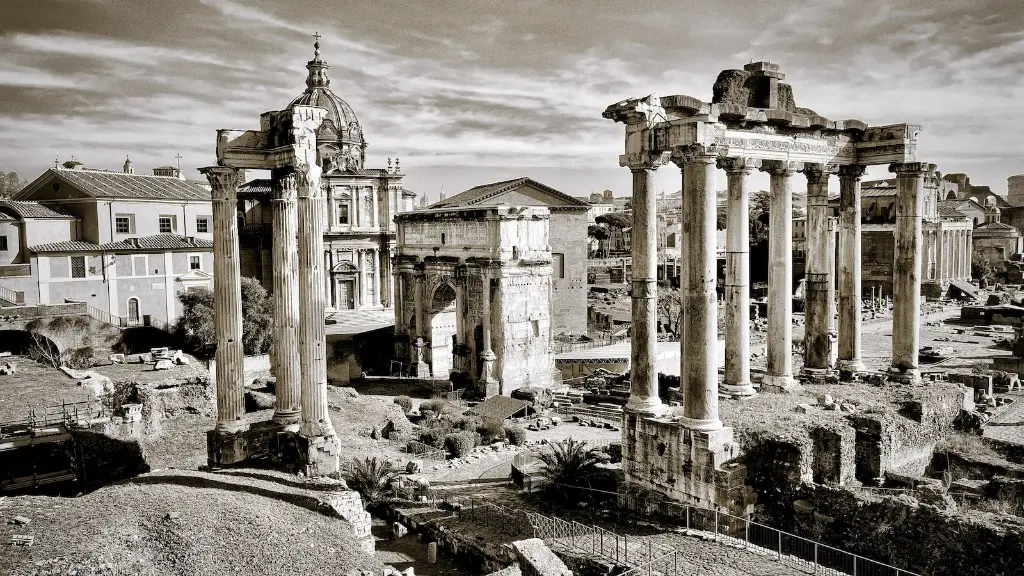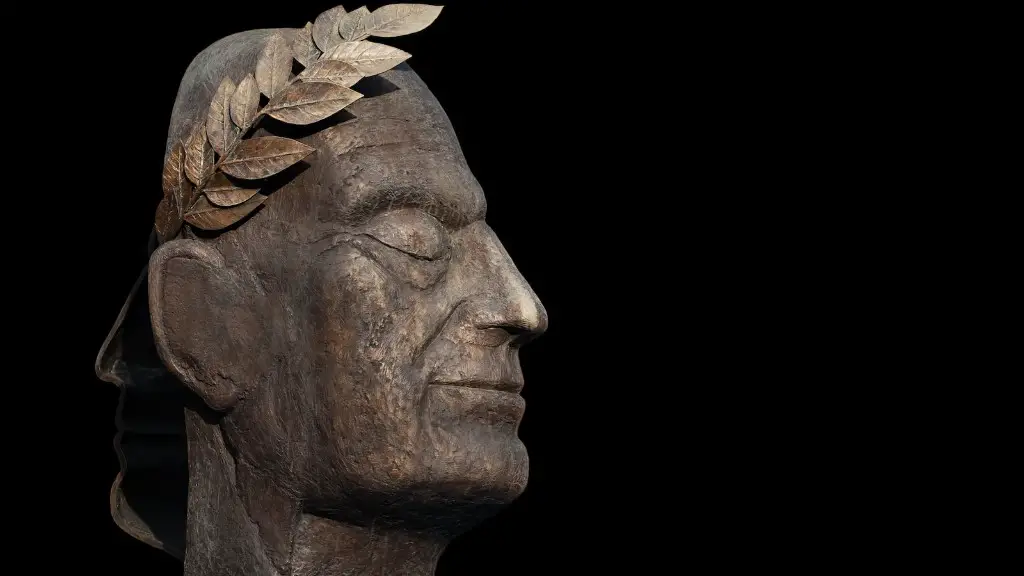Christianity is a religion with a long and complicated history. It began in the Middle East and eventually spread to Europe. Christianity is based on the belief in one God who created the world and all its inhabitants. Jesus Christ is the Son of God and the Savior of humanity. Christians believe that Jesus was born of a virgin, died on the cross to save humans from their sins, and was resurrected on the third day. The Christian faith is centered around Christ and his teachings. Christianity is one of the largest religions in the world, with over 1.2 billion followers worldwide.
Christianity was not viewed favorably in ancient Rome. It was seen as a threat to the traditional Roman values and way of life. Christians were often persecuted and martyred for their beliefs.
How was Christianity used in ancient Rome?
In AD 313, the Emperor Constantine made Christianity legal and for the first time, they were allowed to openly worship. Churches were quickly built not just in Rome but throughout the empire. In AD 391, the worship of other gods was made illegal.
The Christian religion is based on the belief in one God, which was different from the traditional Roman religion, which believed in many gods. This difference in beliefs led to persecution of Christians by the Romans at different times. The Christians were popular among the poor, which may have also led to their persecution.
Was Christianity popular in ancient Rome
Christianity continued to spread through the territories of the western Roman Empire after its fall in 476. Over the next several centuries, it became the dominant religion in the city of Rome as well as the European regions over which the Roman Empire had ruled. Christianity provided a sense of community and stability during a time of political and social upheaval, and its message of hope and salvation resonated with many people. As the Roman Empire declined, Christianity continued to grow and eventually became the dominant religion of the entire Western world.
Christianity was appealing to the people of the Roman Empire because it offered a personal relationship with a god and a way to eternal life. These things brought hope to those who were oppressed by the Empire as the religion was open to all. Christianity offered a message of hope and love in a time when people were living in fear and insecurity. The message of the gospel was one of freedom and liberation, which was appealing to those who were oppressed by the Roman Empire.
Was Christianity illegal in Roman Empire?
The Edict of Milan was a document issued in 313 by the joint emperors Constantine and Licinius that granted Christians full legal rights. This was a significant change from the previous policy of persecution, and it helped to pave the way for the eventual spread of Christianity throughout the Roman Empire.
Rome had the most problems with monotheistic religions, such as Judaism and Christianity, because these religions believed in only one god. This meant that followers of these religions were not allowed to worship any other gods.
Did Rome fall because of Christianity?
Christianity may have played a role in the fall of the Western Roman Empire, but it was not the sole cause. Rome fell in 476 CE, but the Eastern Roman Empire continued to exist until 1453 CE. Christianity may have contributed to the fall of the Western Roman Empire by weakening it from within, but other factors such as economic decline, political instability, and invasions from outside also played a role.
He was the first Christian emperor of Rome, and he helped to solidify the place of Christianity in the empire. He also created the city of Constantinople, which became the most powerful city in the world. Constantine was a major figure in both the secular and religious worlds, and his legacy is still felt today.
When did Rome allow Christianity
The Edict of Milan was a decree issued in 313 by the Roman Emperors Constantine I and Licinius that provided for freedom of religion for Christians throughout the Roman Empire. The Edict of Milan legalized Christianity and gave it official status within the empire. This was a major turning point in the history of Christianity, as it helped to spread the religion throughout the Roman Empire.
The Diocletianic persecution was the last and most severe persecution of Christians in the Roman Empire. In 303, the emperors Diocletian, Maximian, Galerius, and Constantius issued a series of edicts rescinding Christians’ legal rights and demanding that they comply with traditional religious practices. The persecution lasted for ten years, and Christians were subjected to a variety of cruel and brutal treatment, including imprisonment, torture, and execution. The Diocletianic persecution was a turning point in Christian history, and it helped to solidify Christian identity and resolve.
What was the Roman attitude toward religion?
Religious tolerance was an important value in the Roman Empire. The government and the Romans in general tended to be tolerant towards most religions and religious practices. Some religions were banned for political reasons rather than dogmatic zeal, and other rites which involved human sacrifice were banned. However, overall, the Roman Empire was a place where people of different faiths could live and worship together.
Christianity was different from other religions in ancient Rome in that it emphasized beliefs and doctrines. It seems strange, but in ancient Roman religions, it did not matter what a person believed about the gods. Religion was not about what one thought or believed, but about what one did. Christianity, however, put a great emphasis on what one believed, and this set it apart from other religions at the time.
How many Christians were killed in Rome
Though Christians made up a small minority of the population of the Roman Empire, by 325 AD their numbers had grown to as many as 7 million. This growth was largely due to the efforts of missionaries who traveled throughout the empire, spreading the gospel to a wide range of people. Unfortunately, this also led to persecution from the authorities, who often saw Christianity as a threat to their power. As a result, as many as 2 million Christians were killed for their beliefs.
The object of Roman religion was to secure the cooperation, benevolence, and “peace” of the gods (pax deorum). The Romans believed that this divine help would make it possible for them to master the unknown forces around them that inspired awe and anxiety (religio), and thus they would be able to live successfully. The gods were thought to be interested in human affairs and capable of influencing them for good or ill. Consequently, it was important to propitiate them with offerings and prayers. Important occasions such as the founding of a city or the beginning of a war were marked by special ceremonies in which prayers and sacrifices were offered to the gods.
What religion was perceived as a threat to the Roman Empire?
Rome perceived Christianity as a political threat because it was a religion that was opposed to the Roman way of life. Christianity was seen as a religion of peace and love, which was in stark contrast to the Roman way of life, which was full of violence and war.
The Romans were polytheistic, believing in many gods and goddesses, until 509 BC. Christianity began to spread through Rome in 391 AD, and by 476 AD the majority of Romans were Christian. The Roman Empire fell in 476 AD, but Christianity continued to grow and spread throughout the world.
What type of Christianity was the Roman Empire
Orthodoxy, or right belief, is at the heart of the Catholic faith. The Nicene Creed, which was formulated at the First Council of Nicene in 325, is a profession of the orthodox faith of the Church. This Creed is recited regularly by Catholics and is a summary of the orthodox teachings of the Church. Catholicism teaches that there is one true God, who is revealed to us as the Trinity of Father, Son, and Holy Spirit. Our salvation comes through faith in Jesus Christ, who is both God and man. Jesus died on the cross to save us from our sins, and rose from the dead to give us new life. We are saved by grace through our participation in the Sacraments of the Church, which are efficacious signs of God’s love and grace.
Jesus is teaching us that we should obey the laws of the land, but also to put God first in our lives. We should follow God’s laws above all else, and render to Him what is due.
Final Words
In ancient Rome, Christianity was viewed as a new and strange religion. Rome was a very tolerant place when it came to religion, and so new religions were not persecuted. However, because Christianity was such a new religion, it was not very well understood. Many people in Rome thought that Christians were strange and certainly not like the traditional Roman gods that they were used to worshipping. Therefore, while Christianity was not persecuted, it was not very well respected either.
Christianity was not well received in ancient Rome. The Romans were a very religious people and they did not take kindly to a new religion that was trying to take hold in their empire. The Romans persecuted the early Christians and tried to stamp out the new religion. However, Christianity eventually won out and it is now the dominant religion in the world.





